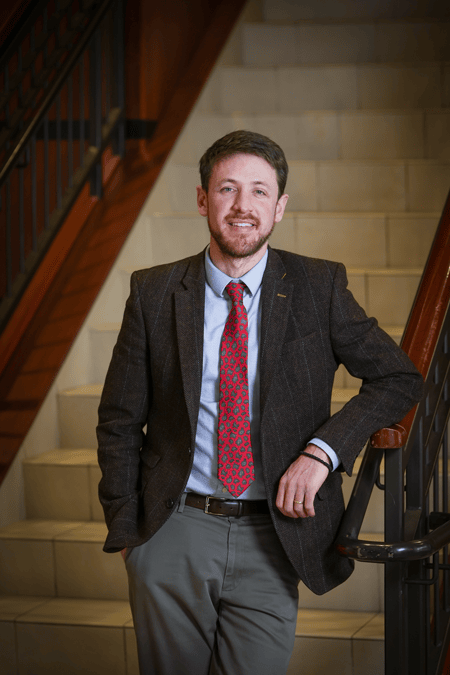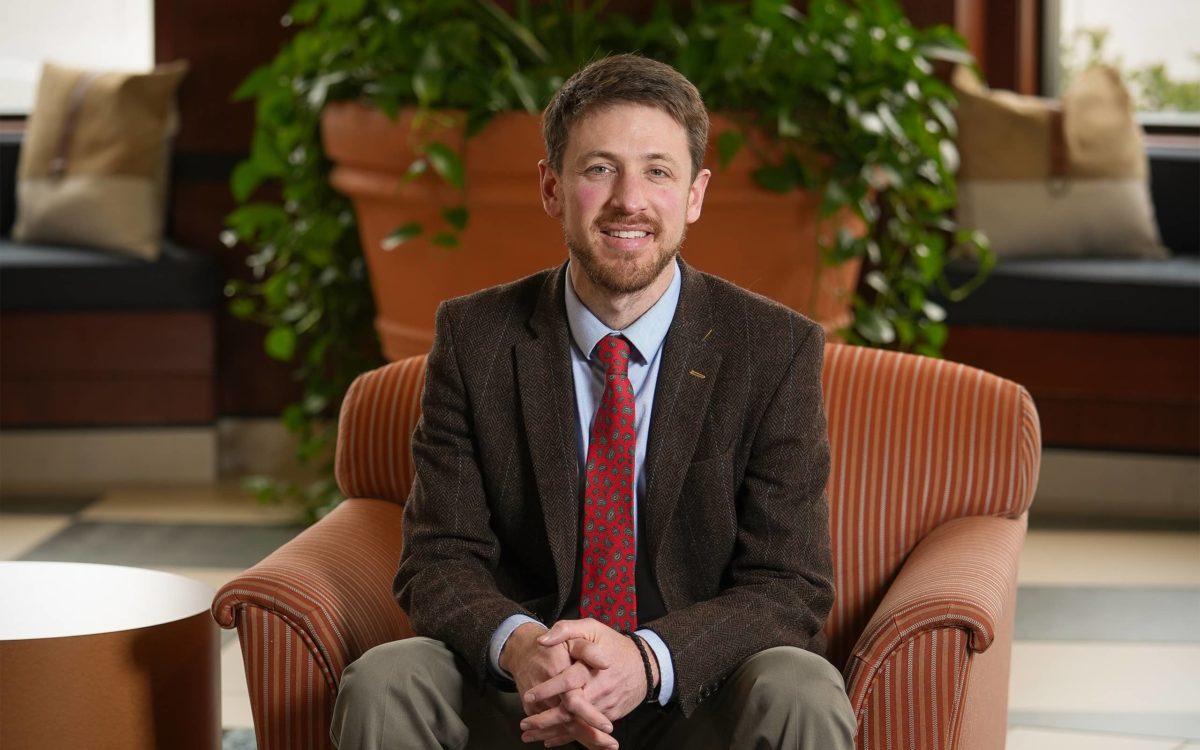The Gift of Creation
Dr. Joshua Kraut
Unless you’re plugged into the French intellectual and philosophical scene, you’ve almost certainly never heard of Fabrice Hadjadj. One Hope College professor is working to change that.
Hadjadj (b. 1971) is a contemporary philosopher and writer, and “a rising star in the French Catholic intellectual firmament,” says Dr. Joshua Kraut, associate professor of French in the Department of World Languages and Cultures and co-director of Hope’s Emmaus Scholars Program.
To introduce Hadjadj’s perspective on ecology to an English-speaking audience, Kraut is translating a collection of his essays and talks on that topic. The volume is under contract with Front Porch Republic Books, which, according to its website, “publishes works about place, localism, community, decentralism, and conservation.” The book will include Kraut’s translation of five to seven essays and talks by Hadjadj (pronounced ah-JAHJ) along with a critical introduction written by Kraut.
“I want to translate him because he’s a really thoughtful voice in a post-Christian society,” Kraut says.
He sums ups Hadjadj’s background as “culturally Jewish, atheist and anarchist,” followed by a dramatic conversion to Catholicism in his twenties and a swift rise through academia as a philosopher and public intellectual.
“I treasure working at a liberal arts school where I can integrate different bodies of knowledge… I’m using French to translate a philosopher writing about ecology and faith — it’s all coming together, and that’s really exciting for me.”
Ecology is just one of the “dizzying variety of topics” he writes about — “he’s enormously productive,” Kraut says. Hadjadj also writes and speaks about art, technology, the family and transhumanism. He’s written a comic and a trilogy of children’s books and released a musical album. And he directs the Philanthropos Institute in Switzerland, which offers a year-long program of education and spiritual formation centered on philosophical and theological anthropology, daily Eucharist, manual work and theater.
Kraut sees Hope as a natural incubator for translation of Hadjadj’s wide-ranging work. “I treasure working at a liberal arts school where I can integrate different bodies of knowledge,” he says. “I’m using French to translate a philosopher writing about ecology and faith — it’s all coming together, and that’s really exciting for me.”
When it comes to Hadjadj’s Christian approach to ecology, Kraut compares the French polymath to the American farmer and writer Wendell Berry, because both point out that “it’s not an insignificant part of discipleship to pay attention to the whole of creation,” Kraut notes.
“Hadjadj diagnoses our current moment of gnosticism — the flight from the material, the flight from the body, the impulse to upload our consciousness to the cloud,” he said. “For Hadjadj, losing track of the material world is a spiritual problem, and it will get you into a lot of trouble.”
Kraut characterizes Hadjadj’s work as pushing against “the fact that we’ve given up on creation as a gift to be contemplated, a gift that actually turns our gaze upward. And when you abandon that, you start to think, What can I make of all of this raw material to better assist me in pursuing my own vision and dreams? — as opposed to seeing that creation is valuable in and of itself.”
If there are two polarized ways of seeing the world — at one end a materialist, utilitarian perspective that encourages us to exploit nature as a resource for our own needs, and at the other end a sort of neo-pagan spiritualization of nature that Hadjadj calls “the cult of Gaia” — then Hadjadj writes against both of these tendencies by presenting a third, Christian approach to ecology grounded in givenness, sacrament and Sabbath.
“[Fabrice] Hadjadj diagnoses our current moment of gnosticism — the flight from the material, the flight from the body, the impulse to upload our consciousness to the cloud… For Hadjadj, losing track of the material world is a spiritual problem, and it will get you into a lot of trouble.”
Hadjadj’s point of view is Sabbatarian. He acknowledges that, yes, the creation was given to Adam and Eve to work and have dominion over, but the first thing they had to do was nothing: “It seems paradoxical. The first couple was given the mandate to fill the earth and subdue it — to do things — but then immediately comes the seventh day, a day of rest,” Kraut says. In this perspective, we can best engage with creation when we first rest in God by relinquishing control and recognizing our own limits.
Kraut’s forthcoming volume will not be the first time Hadjadj’s work appears in English; there already are translations of two volumes of his theological works. But it will be the first English language publication of his ecological essays and of critical engagement with his work.
“Translating him has been really fun. It’s an unexpected joy,” Kraut says. “It’s very challenging sometimes because there’s a lot of wordplay, but I’ve tried to honor his playfulness.”
“He’s got very Chestertonian turns of phrase,” he adds, referring to the turn-of-the-20th-century British writer and famed wit G. K. Chesterton. “It’s very confident — a lot of clever juxtapositions, a lot of phonetic pizazz.”

In Kraut’s translation of one essay, “Heaven on Earth,” for example, Hadjadj notes how Paul depicts the apostles as “spiritual farmers of a sort, humble before the power that belongs to the humus.” Hadjadj goes on to describe contemporary culture as alienated from and threatened by nature, observing that “Suffering and death, not ingratitude and injustice, are seen as the worst evils, because we’ve forgone saintliness for satisfaction, consolation for comfort and heaven for health.”
“If he were just a boring essayist, it would be a lot easier, but he’s actually very poetic. So it’s stretching me,” Kraut says.
Kraut hopes that people who read his translations will “take away a gratitude for the world that they live in, that they learn to wonder at it — not in a way that divinizes it, and also not in the detached kind of scientific curiosity either, but that they see God’s glory revealed in every square inch.”
“I also hope that they would see their own need for connection to the land, whatever form that takes.” For Kraut and his family, this means they garden and plant trees more intentionally than they used to. “I’m probably not going to be a farmer like Wendell Berry,” he says, “but it has made me ask myself, Am I doing justice to the gift of the earth that God has made? Am I honoring this gift that I’ve been given? I hope the reader would ask the same question.”
Dr. Joshua Kraut’s forthcoming volume will not be the first time that contemporary philosopher and writer Fabrice Hadjadj’s work appears in English; there already are translations of two volumes of his theological works. But it will be the first English language publication of his ecological essays and of critical engagement with his work.

